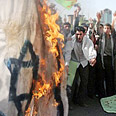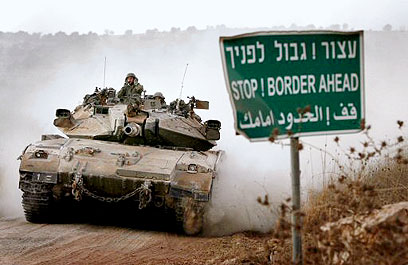
Will we continue putting out fires?
The war in Lebanon is only part of a grand plan 'to wipe Israel off the map.' Therefore, it's not the time for a commission of inquiry but rather the time to take immediate measures in the hope that we'll be better prepared the next time around
This war also has a clear two-stage strategic plan put together in Teheran: The current stage can be called – the guerilla and attrition stage – during which the Palestinians and Hizbullah will create casualties on the Israeli home front by firing rockets and dispatching suicide bombers.
The idea is to humiliate the IDF with severe blows, forcing it to respond and subsequently losing the support of the international community. At the same time, Israeli civilian resistance will begin to crumble, the IDF bereft of its confidence, will have its combat capabilities eroded by the Sisyphean pursuit of terror cells and rocket launching pads.
The next stage
The next stage – Israel's defeat – will witness the active participation of Syria, Iran and perhaps some other warring factors. Ballistic missiles will be directed at Israel under Iran's nuclear patronage. Iran may even decide to use nuclear arms against Israel. As a result, Israel will have no choice but to accede to a political settlement of surrender or disappear.

Photo: Reuters
Those seeking evidence of this strategic plan will find much of it, not only in military intelligence material, but also in the context of speeches made by leaders of the radical front delivered in Damascus, Teheran and Gaza this week. The danger is clear and imminent, and Israel should have put it high on its list of national priorities a long time ago and be prepared to eliminate it completely.
However, instead of simultaneously developing a solution suited to the scope of the threats i.e. rockets, various missiles, guerilla and terror – according to a predetermined plan - our political leadership prefers putting out fires.
Will the missed opportunity turn into a blessing?
Israel doesn't initiate, it only responds, here in an operation in Gaza to minimize the Qassam rockets and there by making arrests in the West Bank. And when Hizbullah provoked us – we hastily embarked on a war, without defining clear military targets and without an overall plan.
The last round in Lebanon revealed almost all the causes responsible for Israel's inability to achieve victory in a war of attrition - the type in which it has been embroiled for the past six years. If we could only learn from this experience, perhaps the missed opportunity will turn into a blessing.
A state commission of inquiry and massive pubic pressure could bring about the desired change. But until such a committee is established and its work completed, many months will have gone by. Meanwhile, the cabinet and the army must take a series of immediate measures so that we don't lose valuable time:
Step 1
The most urgent step is to pressure Lebanon, Hizbullah and the national community to fulfill UN resolution 1701. If no such pressure is applied, we shall lose everything we have achieved and we'll quickly find ourselves in another round of war. To achieve this, Israel's military intelligence would do well to conduct an intensive surveillance effort throughout Lebanon, particularly in the south.
If scathing violations are discovered, Israel must alert the multi-national forces and the UN, and if that doesn't help – they should not hesitate to use isolated military force, even at the cost of political conflict in the international arena, particularly in cases where Nasrallah and his patrons will attempt to re-supply their stock of rockets and missiles and deploy forces in the south.
Step 2
The next step in order of importance and urgency has to be the preparation and execution of a comprehensive answer to the threat of rockets on the civilian home front.
Israel has a reasonable offensive and defensive answer for long range ballistic missiles. However, this war has shown that short range rockets pose no less of a threat – perhaps even more. We don't have good military and technological intelligence for this type of threat, and therefore we must act quickly to develop it.
We must renew and accelerate the development of the Nautilus mobile tactical high energy laser (MTHEL), designed to intercept aerial targets such as rockets and missiles, and which proved to be highly successful during early experimental phases. And we should also accelerate the development of the 'Barak' short range missile interceptors manufactured in Israel.
Both these projects were recently put on hold due to cost efficiency constraints; this was an erroneous decision and should be reversed. If proper budgets and priorities are set, these solutions can be deployed within the next two years.
Simultaneously, we must improve and complete our intelligence and operational coverage that identifies launching attempts of rocket fire and intercepts them in mid air. We learned many lessons and achieved many successes in this matter during the current war - lessons and successes that ought to be applied both in the north and in the south of the country.
In the civilian arena
In the civilian arena we have to complete the protection of the settlements surrounding Gaza and the villages in the north (yes, Arab villages as well), as well as to draw up plans for a quick evacuation of civilians to areas not under attack; for treating weak populations and for quickly rehabilitating damages.
Gil canons before Merkava tanks
Step 3
The third step must be a detailed inspection of the combat strategies and equipment the army is using against guerilla and terror activities in each of the combat arenas. We have learned that the IDF faces a different kind of enemy that operates specific modes of combat and equipment in each of these arenas. Our control on the ground also differs in each of these arenas.
Therefore, what works in the West Bank won't necessarily work in Gaza, and what worked in Gaza and the West Bank failed miserably in Lebanon. We must also plan for the eventuality that the fighting in Gaza will soon resemble the fighting in Lebanon.
Therefore, an immediate answer must be provided for fighting in an area teeming with anti-tank missiles and improvised explosive devices. Such a solution lies in the upgrading of IDF's tanks and the other combat vehicles with active armored protection. Such armored protection exists and it must be made widely available quickly.
Tanks and armored personnel carriers should not be used in guerilla warfare. They do not have many advantages when operating in mountainous terrain and built up areas teeming with anti-tank missiles. They are slow and cumbersome, plus their field of vision and fire are limited.
Anything a tank canon can do in such an area will be done more effectively with a Gil type cannon, carried by a single infantry soldier. Therefore the use of heavy tanks in mountainous terrain and built up areas should be minimized.
Armored wheeled terrain vehicles are better for use in Gaza and the West Bank, and are already in use by the IDF (Zeev). If this vehicle is upgraded with active armor, it will provide troops with the speed and protection required for safely entering and exiting built up areas.
Step 4
The fourth step is to avoid unilateral withdrawals, which will spark further motivation to the fanatic front we are facing. Of course, the army and the civilian sector are in need of several other measures if we are to win the war of attrition that has been forced upon us.
However, if the above measures are put into action, there is a good chance that by July 12th, 2009 we'll be a little better prepared for the next round, if it comes, in Lebanon and in the territories.










